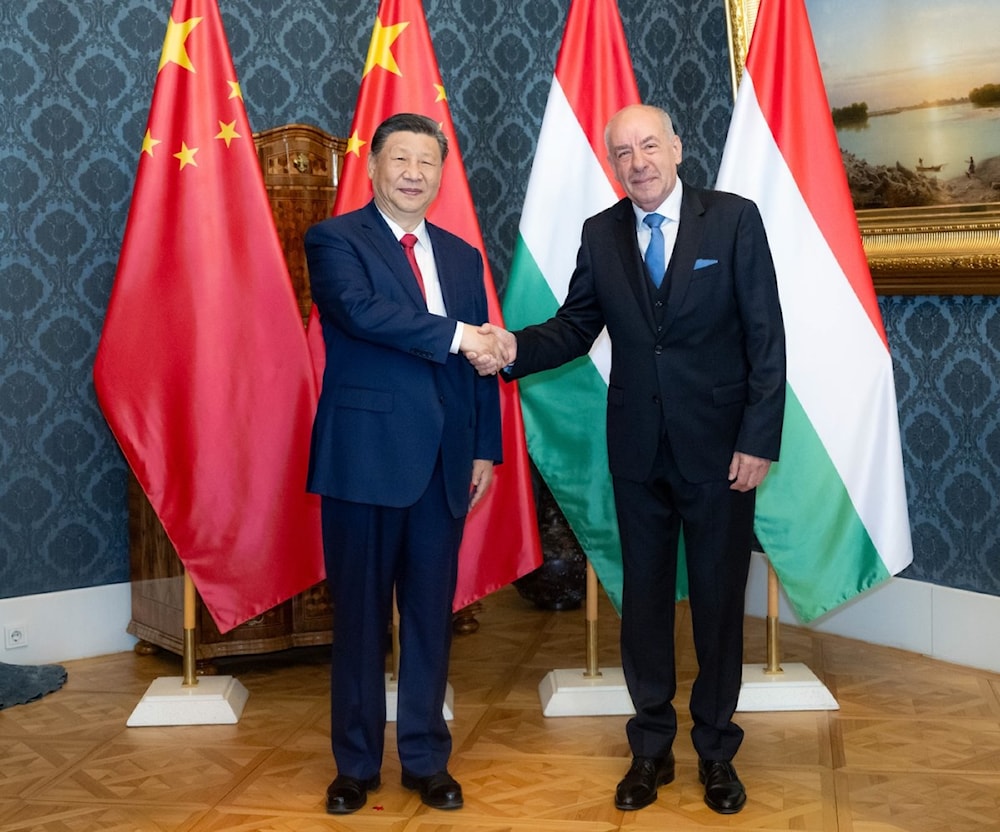Xi Jinping commits to elevating China-Hungary ties
The Chinese leader clarified that the friendship between Hungary and China is not directed against any third party, nor is it influenced by external forces.
-

Chinese President Xi Jinping (left) and Hungarian President Tamás Sulyok (right). (@SpokespersonCHN)
The Chinese Foreign Ministry announced on Thursday that Chinese President Xi Jinping declared his country's readiness to bolster bilateral relations with Hungary, as well as work on strengthening political trust and elevating bilateral relations to new levels.
"President Xi Jinping has expressed his readiness to work together with [Hungarian] President [Tamas] Sulyok to expand the traditional friendship, deepen mutual political trust, strengthen mutually beneficial cooperation and bring the China-Hungary relations to a higher level," the ministry said.
The ministry noted that during their meeting, Xi expressed to Sulyok that Beijing and Budapest should be "on the right side of history."
"[China and Hungary should] uphold fairness and justice, stand on the right side of history, and strive to make positive contributions to the cause of peace and development of mankind," Xi was quoted as saying by China Central Television.
The Chinese leader clarified that the friendship between Hungary and China is not directed against any third party, nor is it influenced by external forces.
He further stressed the importance of both countries firmly supporting each other in safeguarding their sovereignty, security, and development interests.
Xi also expressed hope that Hungary would contribute to the stable and healthy development of China-EU relations during its presidency of the bloc.
Read more: US issues subtle threat to Hungary
Xi has recently concluded a visit to France and Serbia where he met with heads of State to discuss EU-China affairs.
Xi's itinerary began in Paris, where he met with French President Emmanuel Macron and European Commission President Ursula von der Leyen on Monday.
“The Chinese leadership is pretty clear about what they want,” says Abigaël Vasselier, the director of foreign relations at Merics, a German thinktank focused on China as quoted by The Guardian.
Vasselier further highlighted at the time that Xi's primary agenda would revolve around advocating against the EU's anti-subsidy investigations, with a specific emphasis on electric vehicles (EVs), and working to stabilize the bilateral relationship.
Xi warmly welcomed in Serbia
While in Serbia, Xi was reportedly greeted with "such respect and love" that he "will not find anywhere else," as per the words of Serbian President Aleksandar Vucic.
Speaking in defiance of the West's agenda, Vucic said, "We have a clear and simple position regarding Chinese territorial integrity. Yes, Taiwan is China."
Xi's visit to Belgrade coincided with the 25th anniversary of the tragic event in 1999 when the US bombed the Chinese embassy in Belgrade, resulting in the loss of three lives.
"Do not forget that our Chinese friends were with us 25 years ago when this country was being demolished and bombed," Vucic told crowds Wednesday.
The embassy was hit during a months-long NATO campaign led by the US, which aimed to target Serbian security forces engaged in conflict with ethnic-Albanian insurgents in Kosovo.
Following the incident, the US issued an apology, attributing the bombing to alleged outdated maps that led the pilot to mistakenly target the embassy.
Read more: Russia, China reach near complete de-dollarization in bilateral trade

 3 Min Read
3 Min Read









